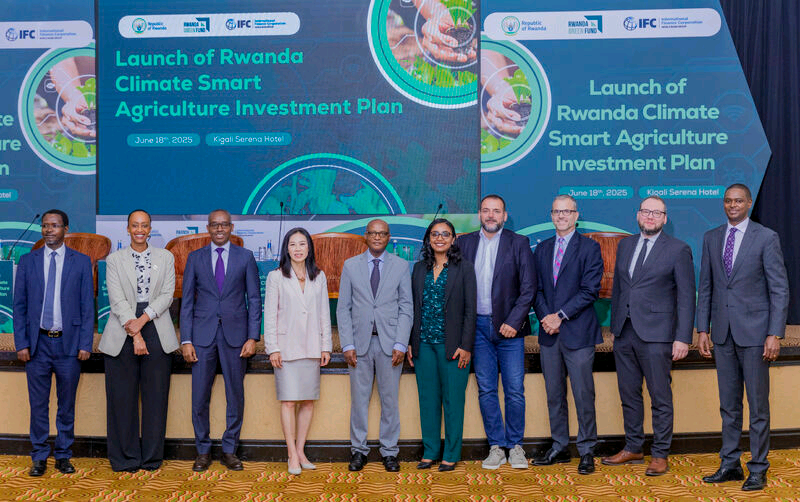Agriculture is the backbone of Rwanda’s economy, providing employment for a large portion of the population and ensuring food security. However, shifting weather patterns such as irregular rainfall, rising temperatures, and prolonged droughts threaten crop yields and rural livelihoods.
To address these challenges, Rwanda has launched a $335 million Climate-Smart Agriculture (CSA) Investment Plan, backed by the International Finance Corporation (IFC). Released on June 18, the plan targets over 83,000 hectares of farmland and aims to boost productivity, improve soil health, and enhance irrigation systems to build climate resilience.
The investment plan identifies RWF 449.7 billion ($335.4 million) in potential private sector opportunities, focusing on agri-finance, irrigation, and soil health projects. It seeks to support more than 170,000 farmers and 375 businesses, driving food security, economic development, and job creation across the country.
Rwanda’s $335 million Climate-Smart Agriculture (CSA) Investment Plan, backed by the International Finance Corporation (IFC), promises to significantly improve the livelihoods of more than 70,000 farmers by promoting sustainable, climate-resilient farming practices.
The plan targets over 83,000 hectares of farmland, aiming to increase productivity, enhance soil health, and improve irrigation systems in a country vulnerable to climate change.
The IFC-backed Rwanda Climate Smart Agriculture (CSA) Investment Plan (IP), released on June 18, identifies RWF 449.7 billion ($335.4 million equivalent) in potential private sector investment opportunities in projects that will enhance and boost the nation’s food production, promoting food security and job creation.
The IFC reiterated on Tuesday via its LinkedIn page that the $335.4 million opportunities for private investment in agri-finance, irrigation, and soil health would help Rwanda achieve its food security, economic development, and climate resilience objectives.
The investment seeks to increase productivity on 83,250 hectares of land while assisting more than 170,000 farmers and 375 businesses.
Long-term and short-term goals
The report, jointly released by the IFC, Rwanda Green Fund, and the Ministry of Agriculture and Animal Resources (MINAGRI), aims to raise awareness, establish an investment pipeline, provide technical help to businesses and farmers, and implement policy solutions. These are the Plan’s short-term priorities.
The Plan’s long-term goals include increasing investment opportunities, enacting regulatory reforms, and obtaining more financing to scale and mainstream climate-smart agriculture projects.
The strategy states that irrigation and water supply will account for almost two-thirds of the overall investment potential.
Other opportunities include improved soil health, post-harvest loss reduction, climate-resilient animal development, and climate-resilient planting and replanting.
“This CSA Investment Plan is in line with Rwanda’s Strategic Plan for the Transformation of Agriculture (PSTA5) which aims to accelerate agricultural transformation through increased climate resilience, productivity, market access, and private sector investment, with the overarching goal of ensuring food security, economic growth, and improved livelihoods,” stated Dr. Mark Cyubahiro Bagabe, Minister of Agriculture and Animal Resources.
He continued, “The Rwanda CSA Investment Plan serves as a roadmap for mobilising investment to support climate-resilient and sustainable agricultural practices and put in place supportive regulatory frameworks.”
Susceptibility to climate change
Rwanda’s agricultural sector is essential to the nation’s economic development and food security. However, the industry is susceptible to climate change, which is endangering crop yields and animal production and putting rural livelihoods at risk. These climate change-related factors include irregular rainfall, rising temperatures, protracted droughts, and soil erosion.
“This strategic initiative enables us to mobilise climate finance at scale, reinforcing Rwanda’s commitment to sustainable agricultural development and private sector engagement,” noted Ms. Teddy Mugabo, CEO of Rwanda Green Fund.
170,200 farmers and 375 businesses to be connected to climate-smart funding
The investment plan proposes establishing long-term business partnerships by connecting an estimated 170,200 farmers and 375 businesses to climate-smart funding through bankable investments.
According to the strategy, 83,250 hectares of land will be supported in becoming more resilient and productive through improved soil health, higher-yielding crops, and effective water usage.
“The Investment Plan provides a national-level strategic framework to prioritise private sector-oriented climate-smart agriculture investment opportunities, identify financing mechanisms, and propose key actions for the government to achieve meaningful impact,” said Jiyeon Janice Ryu, IFC Resident Representative for Rwanda.
A major goal of Rwanda’s National Strategy for Transformation (NST2) is to develop modernised, productive, and climate-resilient agri-food systems.
The strategy aims to increase private investment in the country from 15.9 percent of GDP ($2.2 billion) to 21.5 percent ($4.6 billion).











